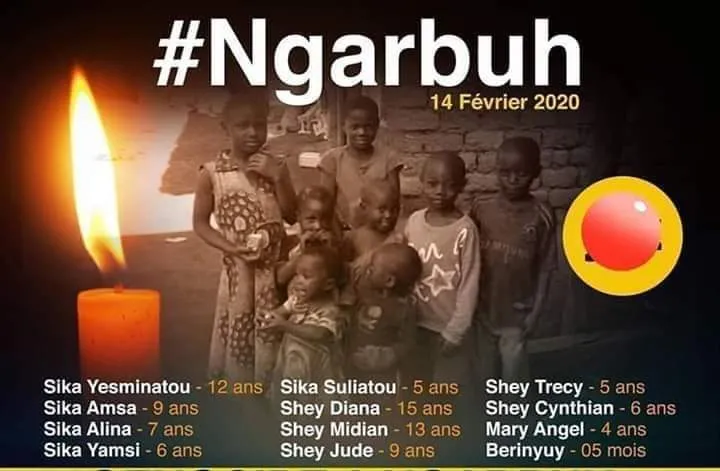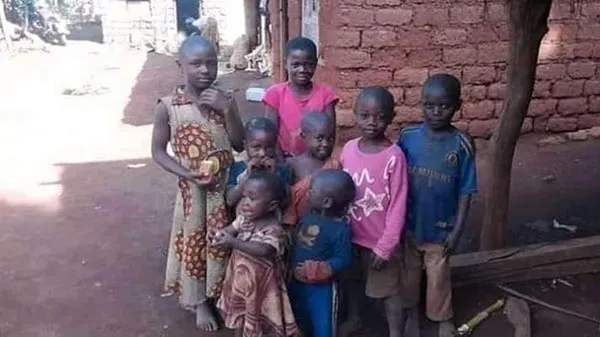It has been four years since the tragic event in Ngarbuh, Cameroon, where 21 innocent civilians, including a pregnant woman and 13 children, lost their lives in a devastating massacre. The Ngarbuh massacre, which took place on February 14, 2020, amidst the Anglophone Crisis, has deeply impacted the community, with the pursuit of justice for the victims still unresolved.
The incident took place in Ngarbuh, specifically in two quarters of Ntumbaw Ntumbaw Village, located in the North West Region of Cameroon. A group of Cameroonian soldiers, along with armed individuals and opponents, committed a violent act in the midst of the ongoing armed conflict between Ambazonia separatists and the Cameroon military.
Jess Craig, an independent journalist, conducted the only on-the-ground investigation for The New Humanitarian, a Swiss-based publication. Craig spoke with dozens of eyewitnesses during the investigation. She stated that 21 civilians had tragically lost their lives, including 13 children and one pregnant woman. Different reports initially surfaced, but the evidence indicated the possible participation of Cameroonian soldiers and armed Fulani militia.
The Cameroonian government initially denied any involvement, claiming that a former Ambazonia fighter had issued warnings to the villagers about potential attacks if they did not remove Ambazonia fighters. With the emergence of additional evidence, it became increasingly clear that the military had a hand in the heinous acts. The government’s explanation for the deaths, which involved an accidental explosion during a firefight with separatists, was met with widespread doubt and allegations of a concealed truth.
“The pain of losing loved ones is compounded by the lack of accountability,” said a UK-based political scientist with Cameroonian roots. “The specter of the Anglophone crisis looms large, making us wonder if justice even has a place in this divided nation.”

Human Rights Watch conducted an investigation that discredited the government’s assertions and verified that Cameroonian soldiers and armed Fulani were responsible for the massacre of civilians. In response, the government alleged that the organisation had colluded with separatists to fabricate stories.
The incident received widespread international criticism, with calls from the United Nations and the United States for Cameroon to take legal action against those responsible. Cameroonian opposition politician Maurice Kamto has urged for a national day of mourning.
Following the incident, the Cameroonian Army apprehended nine soldiers, including two colonels. They asserted that 13 civilians were unintentionally killed during a clash with separatist fighters, involving three soldiers and a local vigilante group. It was indicated in the report that, upon realising their error, the soldiers and militiamen resorted to setting fire to buildings in an attempt to eliminate any incriminating evidence. Three soldiers were taken into custody.
Nevertheless, progress in the pursuit of justice has been frustratingly sluggish, leaving the families of the victims to still wrestle with the lasting impact of their trauma. Many rights organisations have strongly criticised the Cameroonian government, alleging that they have provided misleading justifications for the deliberate targeting of innocent civilians.
At the most recent hearing regarding the massacre on November 16, 2023, witnesses provided testimony and several investigative reports were presented. However, the trial has faced multiple delays, raising concerns about the military judicial system’s ability to ensure justice for cases of military abuse. The restart is planned for this week.
“Justice delayed is justice denied,” said a human rights activist, highlighting the broader implications of the stalled investigation. “In the context of the Anglophone crisis, where human rights violations are already rife, ensuring accountability for Ngarbu becomes a beacon of hope and a possible step towards reconciliation.”
The community has been deeply affected by the aftermath of the Ngarbuh massacre. In late May 2020, a military base was established in Ngarbuh, leading to the displacement of over 300 villagers who fled out of fear. Ntumbaw continues to be a site of conflict between separatists and armed Mbororos, resulting in more civilian casualties and the ongoing cycle of violence.
As the world marks the fourth anniversary of the Ngarbuh massacre, the pursuit of justice for the victims remains ongoing. The international community must remain vigilant and continue exerting pressure on the Cameroonian government to ensure that those responsible for the atrocities are held accountable. The memories of that day should not be forgotten.



